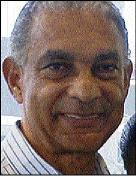Adrian Frater, News Editor

Tulloch
Western Bureau:
Former government minister Francis Tulloch says there are too many loopholes for corruption in the political system, and suggests that new entrants to representational politics should be provided with guidelines and a code of ethics.
"I am not saying that young Kern Spencer is guilty of anything in the present light-bulb situation, but as a young politician, I am sure he would have benefited in some way from a recommendation I made to the Joint Select Committee of Parliament in 1995," Tulloch tells The Sunday Gleaner, which sought his views on financing the cost of political representation.
Tulloch, whose involvement in representational politics started in the 1972 Michael Manley regime, recently opened up his personal files, which paint an ugly picture of the ineptitude that has tainted and scarred the local political process.
Attempt to fix situation
Disgusted by some of the unethical practices he saw in areas such as the awarding of contracts and the avenues it opened for possible corruption, Tulloch cites the minutes of a 1996 Joint Select Committee of Parliament, which was chaired by Dr Peter Phillips, to relate his attempt to have the situation fixed.
In his recommendation, as it appeared in the document, Tulloch stated: 'It is also quite clear to me from my own personal experience that politicians, especially those entering Parliament for the first time, should be given guidelines by which they should abide and a proper code of conduct to follow."
Paying the price
In 1995, he wrote to the leadership of the People's National Party, expressing concerns about what he saw as inappropriate for "any government in power giving lands to party adherents and giving government contracts to incompetent party supporters".
Tulloch, who is known to have had a long history of disagreement with the PNP during his more than 30 years in politics, especially in the P.J. Patterson era, also discloses the price he paid for his almost maverick-like approach in pressing for greater government accountability.
He says if a politician should try to operate above the fray, he would sometimes be labelled by his colleagues as being disloyal.
"I have also sought to safeguard and protect my reputation, sometimes at great cost to myself and my family," Tulloch recounts. However, he says, he made mistakes as well.
He recalls an incident in 1994 where an attempt at acting according to his conscience might have cost him politically. As then minister of state in the Ministry of Tourism, he was issued a VIP courtesy card by the chairman of Sandals hotel chain, Gordon 'Butch' Stewart. Tulloch says after reading an editorial and a subsequent column in The Jamaica Observer, he learned of a situation in England where a member of government had got into trouble for a similar situation.
"After reading the editorial and taking into consideration that the editorial generally reflected the position of the newspaper, I took the decision to return the VIP card," relates Tulloch.
Colleagues upset
On learning about what he had done, Tulloch recounts, some of his colleagues, who had also received VIP cards from Sandals, were quite upset with him. They ignored the fact that under the Westminster style of government, accepting such a gift was deemed unethical.
Within six weeks of the VIP scenario, Tulloch was removed from the Tourism Ministry.
"I am not saying that I was transferred because I returned the VIP card, but I am sure it was not because of any incompetence on my part, because two years later, I was made minister of tourism," Tulloch recounts.
Tulloch also provided documents to express his displeasure with the scope for corruption caused by persons who donate money to political parties and individual members of Parliament, which, he believes, is another gateway to corruption.
Says he: "Those MPs who refuse to accept gifts find it quite hard to function." He added that he had had to walk away from politics several times in order to adequately provide for his family.
Untruthful declarations
In pointing to the scant regard members of the political directorate have for rules and regulations, Tulloch provided documents showing how he and some other members of Parliament untruthfully declared their election spending as per Section 55 (1) of the Representation of the People Act, which requires that no more than $3,000 be spent.
"I have not made my declaration for the 2007 election, but it is my intention to do so, because I consider it as something that should be treated seriously," says Tulloch, pointing out that the system still has not been changed.
"If we as elected representatives don't make proper declarations, others might think it is okay to do the same."
adrian.frater@gleanerjm.com

